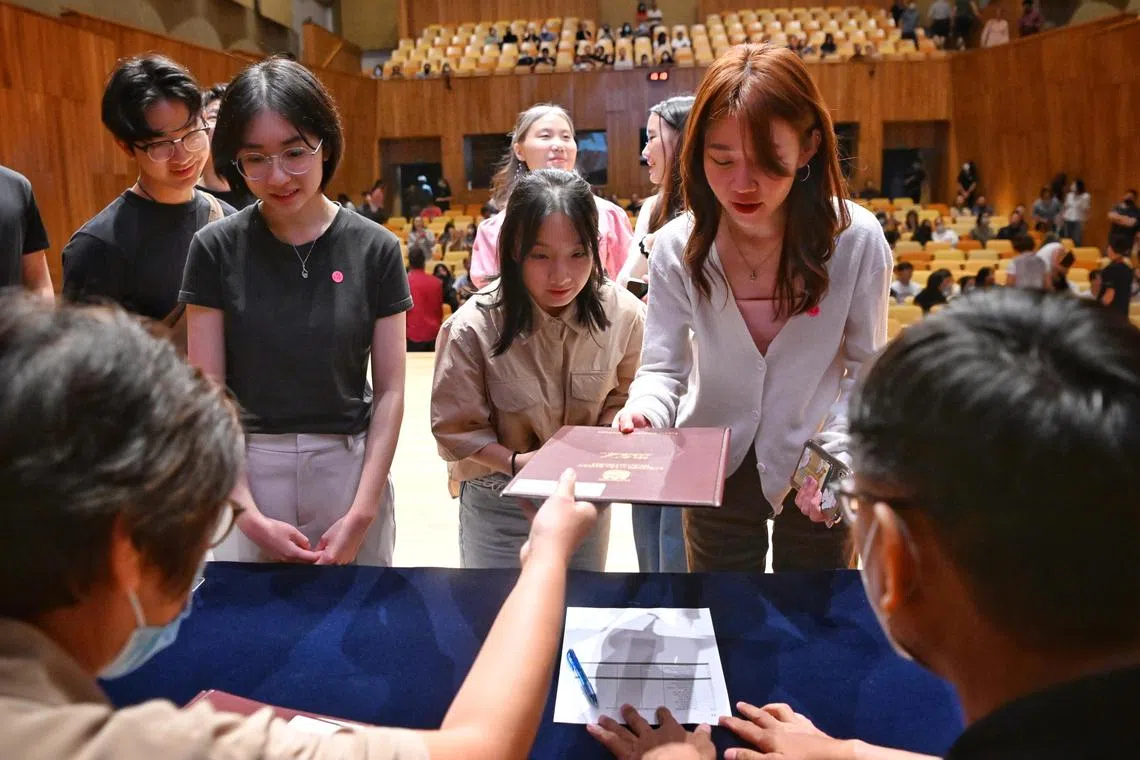askST: Is the IB easier than the A levels?
Sign up now: Get tips on how to help your child succeed

The impressive showing has again left parents and students wondering if the IB exams are easier than the A levels.
ST PHOTO: CHONG JUN LIANG
Singapore - Once again, students from the handful of local schools who sat the International Baccalaureate Diploma Programme (IBDP) exams in November 2022 have done well.
Not only were their average scores much higher than the global average, nearly half of the perfect scorers worldwide
What’s the difference between the A levels and the IB Diploma Programme?
The IBDP and the A levels are both two-year programmes that cater mainly to students aged between 16 and 18 years.
In Singapore, more students – between 11,000 and 12,000 a year – opt for the A-level route. The IBDP is offered by only a handful of local schools and their students sit the examinations in November.
In 2022, 2,276 students from Singapore, including those from schools such as Anglo-Chinese School (Independent) and St Joseph’s Institution (SJI), sat the diploma exam in November.
There is another sitting in May for the IBDP exams, taken mainly by students from the international schools that enrol the children of expatriates in Singapore.
One key difference between the A levels and IBDP is that the latter requires students to take a broader spread of subjects across disciplinary areas. The programme has six subject groups to choose from: studies in language and literature; language acquisition; individuals and societies; sciences; mathematics; and the arts.
The A-level route requires students to take four subjects and at least one of them has to be a contrasting subject. Many arts students tend to choose mathematics, while science students tend to opt for economics as their contrasting subject. Students also have to take up general paper, project work and mother tongue. Those who obtained D7 and above for Higher Chinese in the O levels are exempted from having to take mother tongue.
How are A-level and IBDP students graded?
A-level students are graded almost entirely on their final exams, which tend to be content-heavy.
In the IBDP, the final exams account for about 70 per cent to 80 per cent of the total marks for each subject, while assignments assessed by teachers and checked by external examiners contribute the rest of the final grade.
Other key external assessments are the theory of knowledge essay and the individual extended essay, which are completed by students over a specified period under teacher supervision.
Educators who have taught A-level and IB students say IB coverage is more extensive, but the final exams tend to be less challenging than the A levels. Hence children who are more exam-savvy tend to do better in the A-level exams, while the IB exams benefit students who are good at time management, independent learning and research.
How did IBDP students in Singapore fare?
Singapore students once again came out tops in the latest diploma exams when results were released on Jan 3. A total of 2,276 students from 21 schools here, out of 18,174 candidates worldwide, sat the exams in November.
The average examination score for Singapore was 39.5 out of 45. In comparison, the global average score was 30.9, and for the Asia-Pacific region, it was 35.6.
And 55 out of 120 perfect scorers worldwide are from Singapore. A perfect IB score is 45 points. A parent who did not want to be identified said more than half – about 30 – of the 55 perfect scorers here, including her son, were from ACS(I).
SJI also had impressive results. All 266 IB students who took the exams passed with an average score of 41 points, with 205 attaining 40 points and above.
This is a yearly occurrence. Ever since Singapore schools, starting with ACS(I), joined the two-year pre-university programme in 2005, students from local schools have surpassed global standards, consistently producing about half of the top scorers worldwide at the IB’s November sitting.
In 2021, 133 out of 238 perfect scorers in the November exams were from Singapore. In 2020, the Switzerland-based IB organisation, which oversees the programme including the exams, reported that Singapore produced 55 of the 90 perfect scorers.
Only a handful of local schools – ACS (I), SJI, School of the Arts Singapore (Sota), and Singapore Sports School – offer the IBDP. The latest to do so is the Madrasah Aljunied Al-Islamiah, with its first batch of 25 students taking the IBDP in 2019.
Students in the three international schools set up by ACS, SJI and Hwa Chong Institution also take the IB.
Several international schools, which serve the expatriate community here, including popular ones such as Dulwich College and Tanglin Trust School, also offer the IBDP.
But their students sit the exams in May and receive their results in July. Going by the information posted online, the top international schools, such as Tanglin Trust, which also consider students’ academic abilities for admission, do have students who attain high average scores and perfect scores.
In 2022, Tanglin Trust reported that its IB cohort achieved the school’s highest ever average diploma score of 41.3 points, more than 9.3 points above the world average. It also said Tanglin is typically among the top three international schools in Singapore for IB results. Three of its students achieved 45 points and 11 got 44 points.
Why do so many local students do so well in the IBDP?
One reason pointed out by many educators is that some schools that offer the programme take in academically strong students to begin with.
ACS(I), which has the highest number of students with scores of 44 and 45, for example, has a Primary School Leaving Examination cut-off score of 4 to 7 for those entering the six-year Integrated Programme, where students skip the O levels and aim straight for the IBDP exams in their sixth year.
Similarly, SJI, which reported stellar performance in the IBDP this year, also takes in students who are academically strong.
As National Institute of Education don Jason Tan once commented, there is an entrenched culture in Singapore of wanting to do well in exams, and in the more prestigious schools, the students who are already highly motivated aim to score high in the examinations.
This carries over to the A levels or IB track. No data is available on how many students from schools such as Raffles Institution and Hwa Chong Institution attain perfect A-level scores as the Ministry of Education does not release the figures.
Educators say the growing enrichment industry could also be a factor in students’ success in the IB, after high-end tuition centres offering programmes for IB students reported an increase in students signing up in recent years.
The tutors report that many of the IB students aim for 43 to 45 points, which will give them a good chance of getting into the most competitive degree courses in local universities and top universities overseas.
They also note that local schools provide strong foundations for their students, and the teachers give them extra lessons to stretch them and give them an edge.
Those who tutor A-level students also stress that the IB and A-level curricula do not allow for drilling, and doing well requires deep and critical thinking.
When The Straits Times asked Mr Stuart Jones, head of IB World Schools, if it had done any research on Singapore students’ performance, he said all IB students, regardless of their backgrounds, are nurtured to solve problems, think critically and encouraged to connect their learning to real-world experiences.
He added: “As the IB mission states, we want our students to help create a better and more peaceful world through intercultural understanding and respect.
“A candidate with 24 points, or indeed a young person who excelled themselves to achieve 19 points, can do that just as successfully as someone who has achieved 45 points.”




